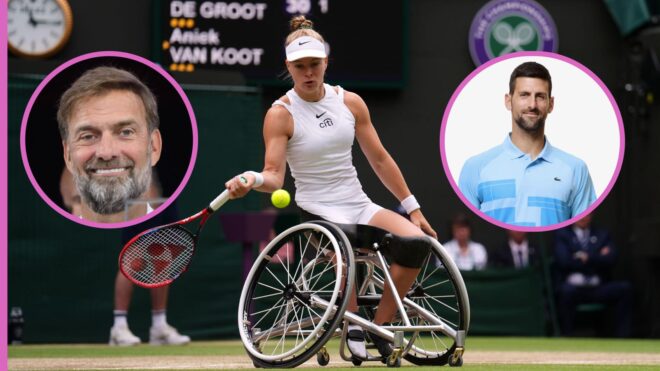
Novak Djokovic stood patiently on the red carpet, waiting for the most dominant force in tennis to spare him a moment.
“Sorry to interrupt,” the greatest male tennis player of all time said to Diede de Groot. “I just want to congratulate you and tell you that you’re an inspiration.”
On a warm Madrid evening, Djokovic had been named Laureus World Sportsman of the Year inside the historic Palacio de Cibeles.
He had also seen the Dutch woman with the longest Grand Slam-winning streak in tennis history honoured for another year of extraordinary achievement.
“It’s an amazing, incredible story,” Djokovic continued. “Your resilience, the power of your mind is something that is truly incredible.”
De Groot, born with uneven leg lengths, has made light of her disability to win 42 major titles in wheelchair tennis: 23 in singles, 19 in doubles.
For three years, between February 2021 and May of this year, she played 145 matches and won the lot – including 15 consecutive Slams.
“She is a remarkable athlete, an incredible ambassador for our sport,” says Djokovic. “Not just wheelchair tennis but tennis as a whole. I follow her, I support her and I’m really inspired by her.”
This week, De Groot is in Paris, aiming to defend her singles and doubles Paralympic crowns.
The clash of dates means no wheelchair tournament at the US Open, currently underway in New York, denying the 27-year old the chance to complete a fourth straight calendar Grand Slam.
She is pretty much unbackable with the bookies, understandable given the Paras are being played at Roland Garros where De Groot has won five French Open titles and not lost since 2020.
A 6-1 6-0 victory over Germany’s Katharina Kruger in her opening match on Saturday did little to dissuade anyone from the view that De Groot is a shoo-in to add to her incredible titles hail. So, speaking to Tennis365 ahead of that match, why is the right-hander so steadfastly refusing to take glory for granted?
The reason is to be found on a clay court in Turkey and the grass at Roehampton, where shock waves are still being felt from De Groot defeats in the World Team Cup and British Open respectively.
“For three years I was unbeaten on the tennis court and then this year I lost my first match in a long time, on clay, the surface that I will be playing on here,” De Groot told Tennis365.
“To come here knowing there are players who are going to make it very difficult for me, they know how to play me, they know what to do..
“It’s different to playing in Tokyo (at the 2021 Paralympics). I had no pressure there – anything was good. Here, I know that only winning is going to be good.”
There is also the small matter of the Netherlands having never failed to win Paralympic gold in nine editions of women’s wheelchair tennis singles – an extraordinary feat helped, in no small part, by the Royal Dutch Lawn Tennis Association (KNLTB) integrating players with disabilities from an early age and allowing them to play in able-bodied events.
De Groot might be up there with Max Verstappen, Virgil van Dijk, Mathieu van der Poel, Femke Bol and Sifan Hassan as Holland’s current greatest sportsperson, an athlete Ruud Gullit, no less, says “makes me proud to be Dutch”.
But while there are challenges out there still to be met – on and off the court – do not expect her to take her foot off the pedal.
“Wheelchair tennis has grown so much,” she told CNN recently. “But there’s always better improvements. I think we’re not prioritised the same way still.”
Breaking barriers
De Groot’s hunger for change is at least as great away from tennis, and since 2021 she has partnered with Nike whom, she says, shares her belief that “sport can break barriers, push limits, spark change and contribute to creating a more equitable future.
“As a woman with a disability, I think about those who have paved the way for me and how they used their platforms to create so much change, even beyond sport. I hope to be a role model for those around me and those after me.”
De Groot hails from a country whose total commitment to cycling allows people with disabilities to use all types of vehicles legally on a network of cycle paths, the like of which Britain can only dream.
Yet she has other concerns on which she elaborated in an interview with the Holland Herald.
“I’m fortunate enough to be able to earn a living doing what I love but, unfortunately, that’s not the case for most disabled athletes,” she said.
“A study in the Netherlands revealed that 85 per cent of respondents couldn’t mention one athlete with a disability, so we still have a long way to go.
“It’s not just about competitions for me any more. I’m excited to be a spokeswoman for the sport and disabled athletes in general.
“I believe that if people were more exposed to parasports and seeing disabled people in the media, they’d be more interested in them.”
The theme was taken up by former Liverpool manager Jurgen Klopp, in Paris to watch close friend Wojtek Czyz compete in the para badminton.
Klopp called for more support for athletes hoping to sustain a career in parasport – and argued that broadcasters should up the coverage.
“We all are ready to watch much more than we show,” he said. “Broadcasting is a business, 100%, I understand that. But I really think we should show much more, because it’s so encouraging. It’s so wonderful.”
De Groot will doubtless raise a glass to that sentiment when she gets a moment. For now it’s back to the business of winning – and providing inspiration to Djokovic and beyond.
Diede de Groot is a Nike athlete. Shop Nike’s tennis range at Nike.com.